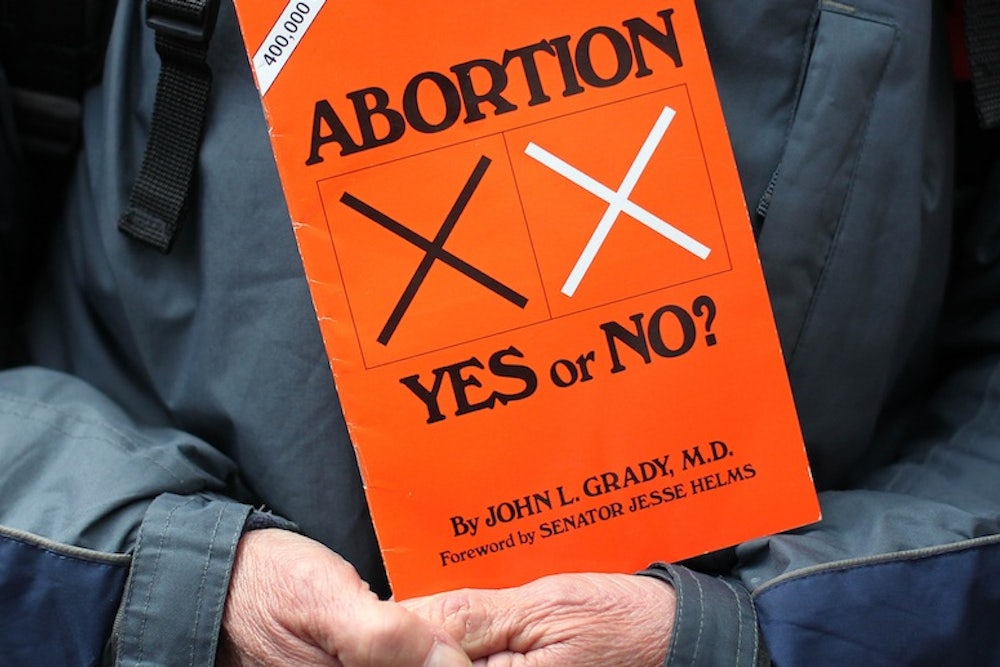The rate of abortions in the United States dropped to its lowest point since the Roe v. Wade decision legalized the procedure nationwide in 1973, according to a study from the Guttmacher Institute. Between 2008 and 2011—the latest year for which there is data available—the national annual abortion rate fell 13 percent, down to 16.9 pregnancy terminations per every 1,000 women of reproductive age. Though the study did not focus on possible reasons for the decline, its authors and the press have suggested that improvements in available contraceptive methods could be among the most important factors.
Experts outside Guttmacher put more weight on another factor that the researchers acknowledged: the economy. When times are tough, “We see people being more regular in their use of birth control, having fewer partners,” and generally taking pains not to get pregnant, said Elizabeth Ananat of Duke’s Sanford School of Public Policy. Though the economy was technically out from under the recession by 2011, unemployment rates for the young and the less educated—the groups most likely to get an abortion—remained dismal.
Though Guttmacher’s latest study shows a precipitous drop, the national abortion rate has in fact been waning since the early 1980’s. “We’re looking at an ongoing decrease based on increasing access to birth control, with fluctuations based on the economy—basically, with how much people want to avoid getting pregnant,” Ananat said.
The Guttmacher study hypothesizes that women’s growing awareness of long-term birth control options like intra-uterine devices (IUDs), which are less fallible than condoms and the pill, is making the difference. But in general, experts are divided over how big a part birth control has played. In a 2012 experiment at Washington University, the abortion rate in St. Louis plummeted more than 20 percent in two years after the school started handing out free birth control to area women. But few other studies have definitively linked contraceptives to a drop in decisions to terminate unwanted pregnancies.
“Just because birth control use went up, that doesn’t tell you anything about access,” or about the reasoning behind the behavior, said Phillip Levine of Wellesley College. Birth control is “a mechanism” by which pregnancies go down—but never the whole story.
One factor Guttmacher largely ruled out: the wave of new abortion restrictions at the state level, which have surged since the 2010 midterm elections. Most of these took effect after 2011 and would not have directly influenced the study’s findings. Guttmacher also found that the decline in abortions was simultaneous with a decline in unwanted pregnancies—consistent with the economic theory. A decline in abortion access alone would create a spike in the birth rate.
It’s hard to predict how long this rate of decline will last. As the economy ticks back up, the decline may slow. Then again, the implementation of the Affordable Care Act may depress the rate further still. Patrick Whelan, a member of the pediatric faculty at Harvard, studied the impact of Massachusetts’ universal health care system in an effort to predict Obamacare’s effects, and found that the rate of abortion went down. “My own strong feeling is that giving girls and women access to care plugs them into the system,” Whelan told me. “They have someone reminding them about contraception. It helps them be more attentive to their health.” The ACA, like the Massachusetts law, mandates insurance coverage of contraception.
“We’re going to be looking at more access to birth control with the Affordable Care Act, and less access to abortion with the new laws,” Ananat said. “It will be interesting, at least from an academic perspective, and worrisome from a social perspective to see, do these cancel out? Or are we going to see a rise in unwanted births?”
